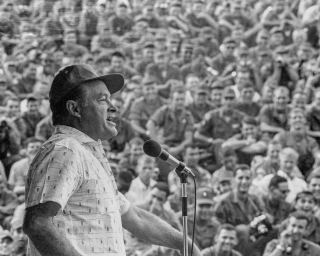Television
The 1960s launched a media boom, making the television set a central focus of everyone’s home. The Vietnam War was the first war to be televised. In 1968, the deadliest year of the war, news programming doubled in length and the nation watched as CBS News anchor, Walter Cronkite, announced that he believed America had lost the war. Setting a tone for years to come, the news became a political force in the polarization of American opinion. Journalists and broadcasters of the war painted American efforts abroad in an unfavorable light. Anti-war demonstrations were on the rise and televised throughout the country. The broadening media landscape of 1969, its daily presence in American homes, and its effect on public opinion became a staple of our modern media landscape.

Smothers Brothers

Political opinions entered televised broadcasts as celebrities used their platforms to express their views. The popular variety show, The Smothers Brothers Comedy Hour, hosted by Tom and Dick Smothers, was a notable example. Despite favorable ratings, the show’s sympathetic anti-war sentiments portrayed in the tone of comedic satire led to CBS censoring their content and an eventual cancellation on April 4, 1969. During their final show, Dick Smothers read a letter from a popular target of their satire, former President Lyndon B. Johnson that read:
It is part of the price of leadership of this great and free nation to be the target of clever satirists. You have given the gift of laughter to our people. May we never grow so somber or self-important that we fail to appreciate the humor in our lives.
Bob Hope and the USO

The U.S. Army faced a challenge of boosting morale among troops. One constant both American troops abroad and families back home looked forward too was the annual televised Bob Hope Christmas Show. Between the years 1964 and 1972, comedian and entertainer, Bob Hope traveled to secret locations in Vietnam to entertain troops. Hope’s shows included comedic monologues, special guests, dancing and singing, and provided a welcome respite for the servicemen and women. Each show was filmed and broadcasted on NBC in January, allowing family members at home to look for their own family members and loved ones in the crowds, hospitals Hope visited, or sitting down to have a Christmas meal in a moment of solitude in Vietnam.

